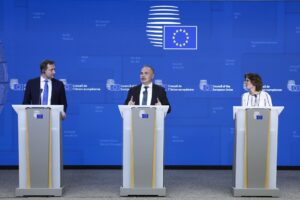Farmer-centric agricultural policy after 2027 receives unanimous support
The EU member states’ agriculture ministers have adopted Council conclusions on the farmer-centric common agricultural policy (CAP) after 2027, which is a fantastic success, as it gives impetus to the entire European farming community and helps maintain the competitiveness of agriculture, the Hungarian agriculture minister said in Brussels on Monday.

(Photo: AM)
István Nagy said at a press conference following the meeting of the member states’ ministers that the conclusions underline the objectives of the CAP, which remain valid: increasing agricultural productivity, ensuring farmers’ incomes, stabilising markets and ensuring acceptable prices for consumers. The work of farmers to guarantee food security is a fundamental public good for EU citizens, he drew attention to. He highlighted that the CAP should contribute to food security globally and support the competitiveness of producers. This requires dedicated and adequate resources and a two-pillar structure, in which direct payments and rural development measures play a key role. The prominent role of basic payments and support for family and small farms, as core values of the European agricultural model, are important, he explained. He also drew attention to the fact that, according to the adopted conclusions, in order to simplify the rules, unnecessary controls should be reduced and reporting should be facilitated with digital technologies. In the field of sustainability, the efforts made by farmers to date are acknowledged and it is emphasized that the green transition can only be achieved with appropriate incentives and the involvement of farmers. Finally, the sector’s resilience to crises should also be improved, by introducing more effective crisis management measures, he concluded. In his opinion, Monday’s agreement on the future of the CAP is a very important result, because in the strategic dialogue launched by the European Commission, exactly opposite opinions were expressed. “We can now create a balance, and we have emphasized the most important message: an independent, strong, common agricultural policy budget is needed,” he added. According to him, the agricultural policy budget should have two separate pillars: area-based payments, which provide income replacement for farmers, and the rural development pillar, which supports investments and developments.
István Nagy emphasized in relation to beekeeping: this sector is not only a source of economic income, as the role of bees in the ecosystem, especially pollination, must also be taken into account
He drew attention to the fact that the European beekeeping industry is negatively affected by the influx of fake honey, therefore quick and simple support is needed to ensure the livelihood of beekeepers. He said it would be advisable to introduce a separate support line in the CAP that rewards pollination activities and provides additional income for beekeepers, thereby recognizing the ecological importance of their work. He highlighted that better methods for testing the authenticity of honey should be developed and the traceability of imported honey should also be improved.
MTI
Related news
János Lázár: rural development is needed, not agricultural policy
🎧 Hallgasd a cikket: Lejátszás Szünet Folytatás Leállítás Nyelv: Auto…
Read more >









